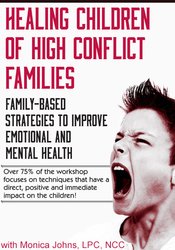
Healing Children of High Conflict Families: Family-Based Strategies to Improve Emotional and Mental Health
Credit Available - See CEUs tab below.
- Categories:
- Families and Couples
- Faculty:
- Monica P Johns, LPC, NCC
- Duration:
- 5 Hours 33 Minutes
- Original Program Date:
- 11 Apr, 2017
- SKU:
- POS049550
- Media Type:
- Online Learning
Description
Do you work with children of high-conflict families who are caught in the middle of toxic and never ending parental conflict? These children are torn between both parents and forced to lie or take sides—afraid to love one parent while in the presence of the other. They suffer from fear of abandonment, low self-esteem, self-hatred, and lack of trust. And, they are resentful, depressed, anxious, and angry. Their oppositional behaviors get them into serious trouble, landing them in the juvenile court system. If you are frustrated because your strategies do little to improve your client’s mental and emotional health—look no further!
Join high-conflict family expert Monica Johns, LPC, NCC, and learn concrete family-based strategies that have a positive and immediate impact on these children, including such as:
- Integrating client-centered techniques including Motivational Interviewing, Solution-Focused Therapy and Emotional-Focused Therapy into therapy
- Tools to assess parental alienation behaviors and Hostile Aggressive Parenting
- Techniques that guide co-parents to move past their toxic hostility, anger, revenge, manipulation, resentment
- Activities to teach families non-hostile communication, conflict resolution and relationship-building skills
- Methods to detect and navigate parental and child manipulation and agendas
- Activities that teach children self-care, resiliency and coping strategies
- Steps to becoming a successful court-appointed therapist
After this recording, you will be able to evaluate these high conflict families, assess their needs, make recommendations, and educate other professionals on the damage of this never ending conflict. Your new skills will open the door to a new, healthier family structure and improve your clinical success rate!
CEUs
This course is available for 6.0 total CPDs.
The HPCSA has declared that any on-line courses CPD/CEU credited by a certified US board, is automatically CPD/CEU credited in South Africa.
As there are different boards for different disciplines, we at Acacia suggest that you use the Counselling CPD/CEU credits. These correspond to South African credits of one CPD/CEU per 60 minutes. If you choose to use your discipline's credits, please do so at your discretion.
PESI, Inc. is an approved provider with the Florida Board of Clinical Social Work, Marriage and Family Therapy and Mental Health Counseling. Provider Number 50-399. This self-study course qualifies for 6.0 continuing education credits.
Handouts
| File type | File name | Number of pages | |
|---|---|---|---|
| Manual (1.54 MB) | 25 Pages | Available after Purchase |
Target Audience
Addiction Counselors, Case Managers, Chaplains/Clergy, Counselors, Marriage & Family Therapists, Psychologists, Social Workers, and other Mental Health ProfessionalsObjectives
- Illustrate the psychology of a high-conflict family and how they attempt to manipulate others.
- Identify Hostile Aggressive Parenting and parental alienation behaviors.
- Demonstrate techniques to motivate and challenge co-parents in making child-focused decisions.
- Construct a safe environment giving children permission to love both parents.
- Employ effective strategies to navigate and defuse family grief, anger, revenge and conflict addiction.
- State the ethical necessity to reduce high conflict for the emotional and mental health of the children.
- Design and inspire a supportive, family-friendly team of professionals.
Outline
Illustration of a High Conflict Family (HCF)
- Long-term impact on children's mental and emotional health
- Hostile Aggressive Parenting (HAP)
- Parental alienation behaviors
- Parental personality disorders
- Alienation vs. estrangement vs. justified resistance
Assessment Tools to Measure
- Strength of the perceived alliance between parents
- Parents’ ability to cooperate and negotiate with each other
- Willingness vs. ability
Techniques and Strategies to:
- Confront family anger, revenge, fear, conflict addiction, grief and embarrassment
- Detect and navigate parental and/or child manipulation and agendas
- Explore and challenge a child's resistance to parental contact
- Educate parents and child the effects of high-conflict families
- Diffuse parental conflict while teaching them to remain child-focused
- Challenge co-parents to make child-focused decisions
- Overcome strong alliance and internalized false beliefs
- Manage parental personality disorders
- Teach coping, self-care and resiliency skills
- Develop non-hostile communication and conflict resolution skills
- Promote healthy co-parenting skills and relationship-building skills
- Eye opening family strategies
Alternative Dispute Resolution as an Intervention
- Parent Coordinator
- Co-parent counselor
- Parenting plans
- Collaborate with attorneys, schools, social services, guardian ad litems
Family System Approach: A Step-by-Step Process on How To:
- Conduct a home visit
- Clean up the boundaries
- Establish the rules
- Create safe place
- Manage family meetings
- Access needed support systems
Ethical Obligations
- Confidentiality
- Emotional abuse and neglect
- Reporting/involving Child Protective Services (CPS)
- Ethical violations
- Dual relationships and impartiality
- Impact of ongoing custody litigation on treatment
Please wait ...
